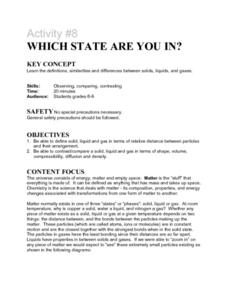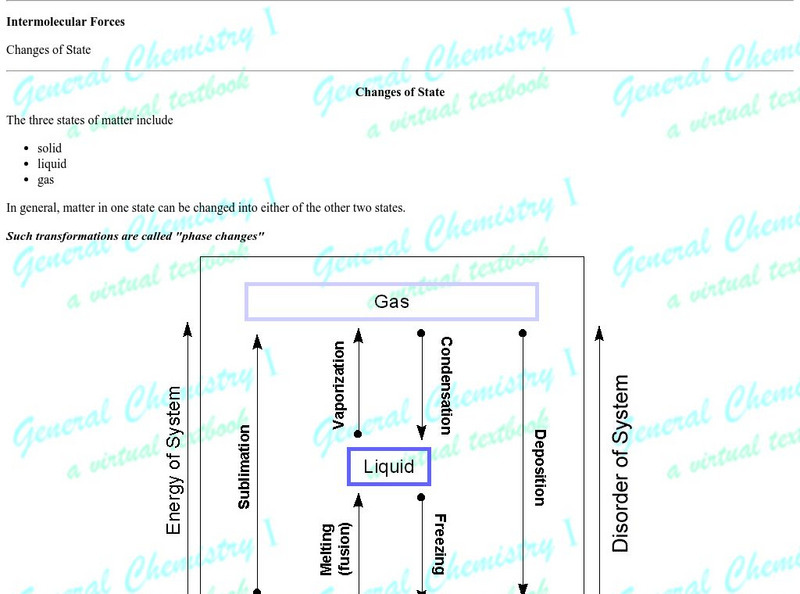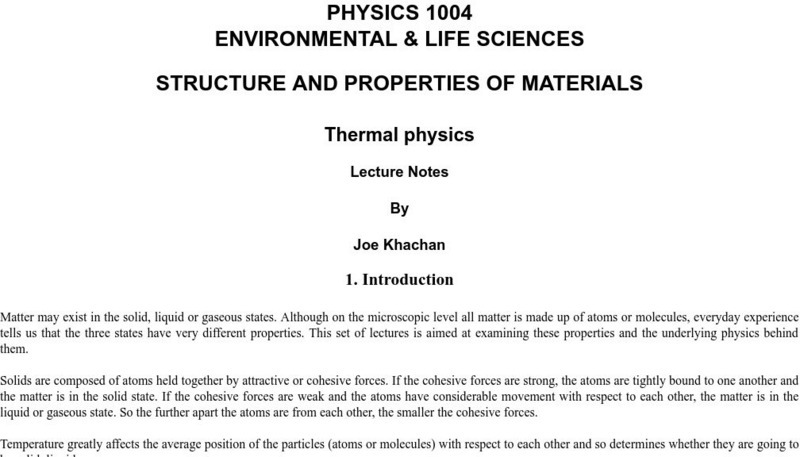Curated OER
Activity #8 Which State Are You In?
Middle schoolers define, give similarites and differences between solids, liquids, and gases. They compare and contrast a solid, liquid and gas in terms of shape, volume, compressibility, diffusion and density. Pupils classigy common...
Curated OER
The Interactive Periodic Table of the Elements
Students study the different types of metals. In this investigative lesson students watch a demonstration on the effects of temperature on atoms and take a tour through baone matter.
Sophia Learning
Sophia: Labeling a Phase Change Diagram
This lesson will introduce a phase change diagram for water, relating energy to progress of a phase change, with labeling including specific heat values, heat of fusion value and heat of vaporization value.
CK-12 Foundation
Ck 12: Chemistry Simulation: Phase Change
[Free Registration/Login Required] Explore how heat and temperature relate to phase changes.
Chem Tutor
Chemtutor: Walking Up the Phase Change Graph
Good exercise graphing a phase change graph from solid to liquid to graph. Includes temperatures and all energy changes for water through this process.
Science Education Resource Center at Carleton College
Serc: Freezing and Phase Change: How Do You Make Ice Cream?
Students will be expanding a study of phase changes after experiences with exploration of the three phases of matter. They apply what they have learned through freezing water and create a tasty ice cream treat.
Frostburg State University
Frostburg State Chemistry Online: Water Bond Angles & Phase Changes
Describes the bond angle of the water molecule during the transition from liquid to gas state. Also provides several examples and explanations for responses and answers given.
National Association of Geoscience Teachers
Nagt: Demonstrating Climate Change and the Water Cycle
Demonstration of the greenhouse effect and its role in climate change, discussion of the phases of water and the water cycle, and a hands-on experiment to investigate the role of temperature in phase changes of water.
Michael Blaber, PhD
Florida Sate University: Changes of State: Heating Curve for Water
Discusses the phase changes and heating processes of water and how this can be illustrated with a heating curve.
Chem Tutor
Chem Tutor: Chemistry: States of Matter
This lesson focuses on the states of matter: solids, liquids, and gases. It also discusses the Kinetic Theory of Matter, Thermodynamics, Triple point, Phase Change Graphs and the Heating Curve of Water. It provideds adrawing of a heating...
Other
Water on the Web: Studying Heat Budgets of Lakes
Interesting activity that discusses many aspects of the energy in a lake, including the evaporation of the water into gas.
University Corporation for Atmospheric Research
Ucar: Just a Phase: Water as a Solid, Liquid, and Gas
This site helps students construct a model of the arrangement of water molecules when present as solid, liquid or gas. Includes background information, lesson plans, links to standards and assessment ideas.
Museum of Science
The Atom's Family: Phases of Matter
Help the Phantom choose a material and observe the changes at different temperatures in the molecule chamber. What happens to the elements or molecules as the temperature changes?
New York University
New York University: States of Water
Use this resource to learn about the three different phases of water; solid, liquid, and gas. What happens to water as it changes into a solid or gas? Includes short and easy to do activity.
Chem Tutor
Chem Tutor: States of Matter
A very descriptive site that allows students to understand the different states of matter at the atomic level. Also discusses the process of phase changes and displays phase change graphs. Thermochemistry is also touched upon for high...
Utah Education Network
Uen: How Do You Dew?
See how the processes of condensation and evaporation occur.
Utah Education Network
Uen: Trb 4:1 Investigation 2 Why Does a Puddle Shrink?
Classroom activity helps students understand evaporation.
E-learning for Kids
E Learning for Kids: Science: Bermuda Triangle: What Is Condensation?
Cindy is at the beach learning a lot about water. Join her to explore the water cycle.
University of Maryland
University of Maryland: Boiling Water by Pumping
A page from the University of Maryland Physics Lecture Demonstration Facility. Provides directions for a teacher demonstration which utilizes a Bell jar and vacuum pump to show the dependency of boiling point upon pressure. Shows...
University of Maryland
U. Of Maryland: Latent Heat: Ice to Water to Steam
A page from the University of Maryland Physics Lecture Demonstration Facility. Provides directions for a teacher demonstration of latent heat in the melting and vaporization process. Shows apparatus and set-up; provides suggestions....
University of Sydney (Australia)
University of Sydney: Structure and Properties of Materials/thermal Physics
An exhaustive set of "lecture notes" on various topics in thermal physics (including thermal expansion). Explanations are well done and more interesting than most. Includes both a mathematical and conceptual treatment of topics. Humor,...
Science Buddies
Science Buddies: What's the Point of Boiling?
You know that water can exist in three separate phases: solid (ice), liquid (water), and vapor (steam). To change from one phase to another, you simply add (or remove) heat. When water boils, what happens to molecules (for example sugar...
TeachEngineering
Teach Engineering: How Cold Can You Go?
Students explore materials engineering by modifying the material properties of water. Specifically, they use salt to lower the freezing point of water and test it by making ice cream. Using either a simple thermometer or a mechatronic...

















